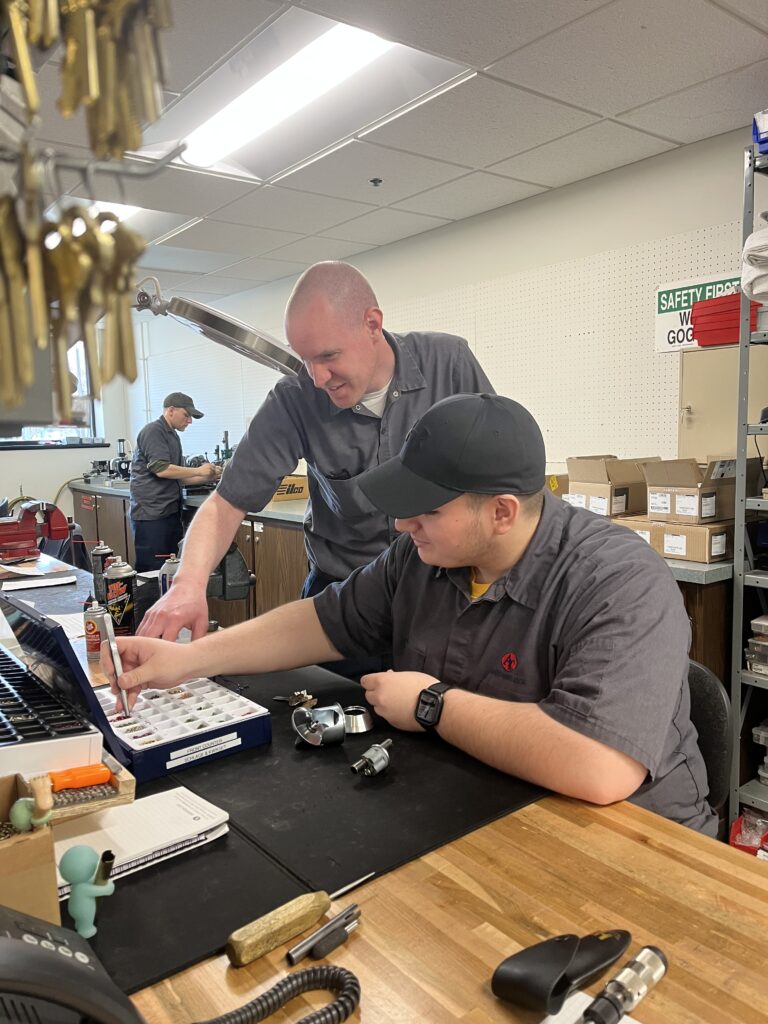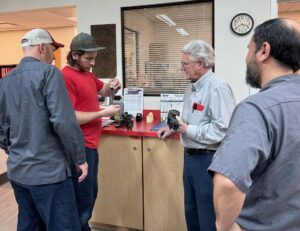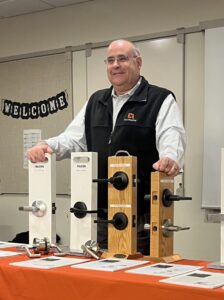
Matt Dolan, Front Counter Manager, shows Adin Gibson, locksmith apprentice, how to pin a cylinder.
Being a locksmith apprentice is the primary way of learning the locksmith trade.
Training trends, like all trends, change.
At Anderson Lock, learning to be a locksmith has evolved from traditional on-the-job training only, with in-person classroom type learning not offered for two or three years after initial employment, to today’s policy of requiring all employees to take Door and Hardware Institute (DHI) online education classes within the first few weeks of beginning here.
Cortney Wascher, current DHI President, points out that education and industry training are evolving to incorporate today’s technology and meet today’s demands…such as adapting to the cultural trend of doing everything online. DHI has expanded and updated educational offerings, appealing to both young professionals starting their career paths and industry experts seeking the next level of learning but desiring to take classes at their own pace, on their own schedule.
Introductory online classes provide an industry overview. The Door + Hardware Industry Associate (DHIA) Certificate recognizes individuals working in a variety of positions in our industry who have achieved a basic technical understanding of product and code applications. To obtain the DHIA certificate, recipients must have completed COR101 – Fundamentals of Architectural Doors and Hardware, and COR102 – Introduction to Codes and Standards, and passed the exams.
Technical industry training follows, usually much later, online and in person, sometimes in other cities.
Working as a locksmith apprentice remains the best way to learn locksmithing skills. New hires must demonstrate: mechanical skills, analytical skills, aptitude for learning, and interpersonal skills for customer service. Furthermore, to be hired as a locksmith apprentice at Anderson Lock, they must be at least 18 years old, be fingerprinted, and pass a criminal background check to qualify for a (required) Permanent Employee Registration Card (PERC) issued by the State of Illinois Department of Financial and Professional Regulation (IDFPR).
Employees must also be familiar with the Illinois Locksmith Act, Life Safety regulations, ADA Guidelines, and policies related to key records. Basic knowledge of key codes, identification of key blanks and master keying are essential for all new hires.
Locksmith apprentices work alongside more experienced locksmiths while learning to install locks, cut keys, re-key cylinders, and much more. They learn to use a variety of trade-specific tools, such as plug spinners, key decoders, key duplicators, locksmith tweezers, and pinning blocks. At Anderson Lock, locksmith apprentices begin employment working alongside more experienced lock techs at our inside front counter. The length of time it takes to become a skilled locksmith varies greatly for each individual.

Brian Paluch, Joe Trinite, Gary Ipsen and Nick Nikolaev discuss an installation solution.
Because Anderson Lock is a commercial lock sales and service company, with a second location for our Door Division, we also dispatch a team of installation technicians. Our installation apprentices meet the same criteria as our locksmith apprentices, but they specialize in the installation of doors / frames and security door hardware. They troubleshoot and repair door closers, automatic door controls, exit hardware, hinges, and, of course, a multitude of locks. They must also learn to repair or replace door frames, thresholds, weatherstripping and related door accessories. Installer apprentices are mentored by more experienced outside service techs until they are ready to be assigned to a service truck and sent out on their own. Knowing finishes and functions of all the locksets from the wide variety of manufacturers Anderson Lock represents, takes years of experience, but no one is expected to learn everything all at once!
The art of Master Keying represents a highly skilled area of locksmithing
Although apprentice locksmiths can learn to put pins in the right places in a cylinder, according to the key code, and cut and stamp keys to operate a lock, creating and maintaining Master Key Systems requires a deeper understanding of mathematical extensions and limitations of codes. Equally important is customizing the MK System to the building or buildings where it will function to provide both security and convenience to users.
Although Anderson Lock’s master key experts create and maintain new MK systems every day, computerized master key programs are often relied upon to easily generate the larger, more complex systems that may require more than one keyway, several sub masters, and dozens of change keys.
Learning about all the products available at Anderson Lock may seem overwhelming to new employees
As new security door hardware products are introduced to the marketplace, manufacturer’s sales representatives visit Anderson Lock to demonstrate new features and share detailed information. For the past several years these meetings, called “TMM” for The Monthly Meeting, have been held at Anderson Lock early in the work day, and are limited to once a month. Donuts and coffee are typically served along with a PowerPoint presentation.

Allegion’s Bradley Black at our recent Lunch & Learn
Today’s “Lunch & Learns” follow the same pattern: sales reps bring products and PowerPoints to the workplace… but instead of donuts and coffee in the morning, they bring lunch at lunchtime! Recently, Allegion’s Bradley Black, and several team members, hosted meetings at both our Main Office and Door Division. It presented an opportunity to learn about Allegion’s Falcon product line, see and touch product samples, and ask questions while enjoying lunch together.
Lunch & Learns can be recurring, like our TMM’s, or stand-alone events, like ours with Allegion.
Other types of in-person training, such as for our boom and scissor lift, or to become certified for specific access control products, are offered to select employees who will benefit from specialized training.
Ongoing training at Anderson Lock is offered both online and in-person. Many DHI classes are customized for specific industry career paths. Some techs learn advanced Master Keying, some specialize in Access Control Systems, some are certified to do Fire Door Inspections. There is a lengthy list of available classes for learners new to the industry, or with years of experience.
Anderson Lock is a licensed locksmith company in the State of Illinois
If you are truly interested in becoming a locksmith, make sure you work for a licensed locksmith company. There are countless phony locksmith companies with websites.
Cortney served on the Illinois Private Detective, Private Alarm, Private Security, Fingerprint Vendor and Locksmith Board of the Department of Financial and Professional Regulation for 10 years. This advisory board reviews cases brought before the state, and makes recommendations according to current laws and practices.
Cortney is dedicated to assuring that the citizens of Illinois are safeguarded from unscrupulous business practices, and that the locksmith industry maintains its trustworthy reputation with proper regulation of locksmiths through licensing and P.E.R.C. cards.
Don’t be fooled. Look for an Illinois locksmith license number (our is IL Locksmith License #0192-000117), and lookup their physical address. (Google has attempted to thwart the call-center type companies, which often operate out-of-state, or even out-of-the-country.) Scammers now list a local “Dispatch Center” address, which may be someone’s apartment. If there is not an actual company location, with a verifiable address, don’t call them.



